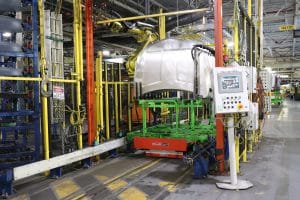After more than a century of building cars and trucks, General Motors is shutting down its Oshawa Assembly operations this week as the company converts the plant to a stamping facility producing aftermarket parts.
Approximately 300 employees will continue to work at GM’s new parts operation in Oshawa starting in 2020, with opportunities for additional jobs as the operation grows under an agreement negotiated earlier this year with Unifor, the union representing Canadian auto workers. The plant has been producing 2019 Chevrolet pickup trucks to help maintain dealer stocks.
Scott Bell, GM Canada president, noted the company is investing C$170 million to convert the plant from assembly to parts stamping and to create the 55-acre McLaughlin Advanced Technology Track where GM software engineering teams engage in real world testing of autonomous, electric and other advanced vehicles.”
(General Motors, Unifor ink deal for Oshawa plant)
The Canadian Technical Center campuses in Oshawa and Markham are partnering with Canada’s leading universities and during the past two years the center has worked with more than 1,000 emerging Canadian tech companies. “We have the largest automotive software development team in Canada, and we’re GM’s largest advanced technology center outside of the U.S.,” Bell noted.
Approximately 100 Oshawa Assembly’s salaried staff have been transferred to other GM operations in Ontario.
Meanwhile, all Oshawa Assembly employees are eligible for GM paid training or educational support toward their next career, GM officials said. The company is working with local colleges and universities to link training with new career opportunities.
For many, the transformation of General Motors in Oshawa is emblematic of wider changes in the economy. Change is hard and 2019 was especially so, for many of GM’s Oshawa employees and the wider Oshawa Community.
(Rock star Sting joins protest against GM Oshawa closure)
“I want to sincerely thank all our employees at Oshawa for consistently demonstrating such genuine pride in the vehicles they built. The facility has such a celebrated history. But the Oshawa plant is not closing – it is transforming. And a few valuable lessons have been learned along the way,” Bell added.
“Our Oshawa community partners also stepped forward in 2019 and we thank them greatly for that. Some of the first calls we received came from our new Oshawa mayor and the president of Durham College,” he said, adding that the college held a job fair where 5,000 possible job opportunities were available for Oshawa employees to explore.

GM Canada’s Travis Hester and Unifor’s Jerry Dias announced the“Transformation Agreement” for the Oshawa plant.
The move was announced in May and in addition to the training opportunities, 50% of the company’s workforce was eligible for retirement. The company offered “enhanced” retirement packages to those workers.
GM also closed four plants in the U.S. in places such as Warren, Michigan, Baltimore, Maryland and Lordstown, Ohio. A fourth plant in Detroit was spared the ax and GM also announced plans for a new $2.5 billion battery venture in Lordstown through a 50-50 joint venture with LG Chem.
(Canadian workers return after protest at GM’s Oshawa plant)
In addition, GM is underwriting the acquisition of the Lordstown plant by a fledgling startup company, Lordstown Motors, which is owned by parent company Workhorse Inc. That company produces electric pickups and other battery-electric vehicles. The company already has an order to produce electric commercial trucks for UPS.


